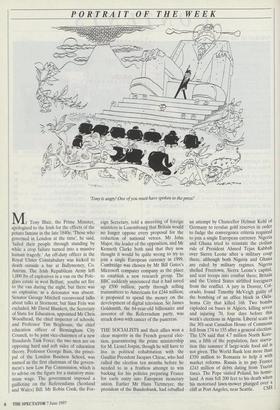PORTRAIT OF THE WEEK
'Tony is angry! One of you must have spoken to the press!'
Mr Tony Blair, the Prime Minister, apologised to the Irish for the effects of the potato famine in the late 1840s; 'Those who governed in London at the time', he said, 'failed their people through standing by while a crop failure turned into a massive human tragedy.' An off-duty officer in the Royal Ulster Constabulary was kicked to death outside a bar at Ballymoney, Co. Antrim. The Irish Republican Army left 1,000 lbs of explosives in a van on the Pole- glass estate in west Belfast; youths set fire to the van during the night, but there was no explosion, as a detonator was absent. Senator George Mitchell reconvened talks about talks at Stormont, but Sinn Fein was excluded. Mr David Blunkett, the Secretary of State for Education, appointed Mr Chris Woodhead, the chief inspector of schools, and Professor Tim Brighouse, the chief education officer of Birmingham City Council, to be joint vice-chairmen of a new Standards Task Force; the two men are on opposing hard and soft sides of education theory. Professor George Bain, the princi- pal of the London Business School, was named as the first chairman of the govern- ment's new Low Pay Commission, which is to advise on the figure for a statutory mini- mum wage. The government imposed a guillotine on the Referendums (Scotland and Wales) Bill. Mr Robin Cook, the For- eign Secretary, told a meeeting of foreign ministers in Luxembourg that Britain would no longer oppose every proposal for the reduction of national vetoes. Mr John Major, the leader of the opposition, and Mr Kenneth Clarke both said that they now thought it would be quite wrong to try to join a single European currency in 1999. Cambridge was chosen by Mr Bill Gates's Microsoft computer company as the place to establish a new research group. The BBC suddenly announced that it had saved up £500 million, partly through selling transmitters to Americans for £244 million; it proposed to spend the money on the development of digital television. Sir James Goldsmith, the 64-year-old billionaire and inventor of the Referendum party, was struck down with cancer of the pancreas.
THE SOCIALISTS and their allies won a clear majority in the French general elec- tion, guaranteeing the prime ministership for M. Lionel Jospin, though he will have to live in political cohabitation with the Gaullist President Jacques Chirac, who had called the election ten months before he needed to in a fruitless attempt to win backing for his policies preparing France for early entry into European monetary union. Earlier Mr Hans Tietmeyer, the president of the Bundesbank, had rebuffed an attempt by Chancellor Helmut Kohl of Germany to revalue gold reserves in order to fudge the convergence criteria required to join a single European currency. Nigeria and Ghana tried to reinstate the civilian rule of President Ahmed Tejan Kabbah over Sierra Leone after a military coup there, although both Nigeria and Ghana are ruled by military regimes. Nigeria shelled Freetown, Sierra Leone's capital, and sent troops into combat there; Britain and the United States airlifted foreigners from the conflict. A jury in Denver, Col- orado, found Timothy McVeigh guilty of the bombing of an office block in Okla- homa City that killed 168. Two bombs exploded on buses in Algiers, killing seven and injuring 70, four days before this week's elections in Algeria. Liberal seats in the 301-seat Canadian House of Commons fell from 174 to 155 after a general election. The UN said that 4.7 million North Kore- ans, a fifth of the population, face starva- tion this summer if large-scale food aid is not given. The World Bank lent more than £350 million to Romania to help it with market reforms. Russia is to pay France £243 million of debts dating from Tsarist times. The Pope visited Poland, his home- land. A man fell 200 feet to his death when his motorised lawn-mower plunged over a cliff at Port Angeles, near Seattle. CSH










































































 Previous page
Previous page